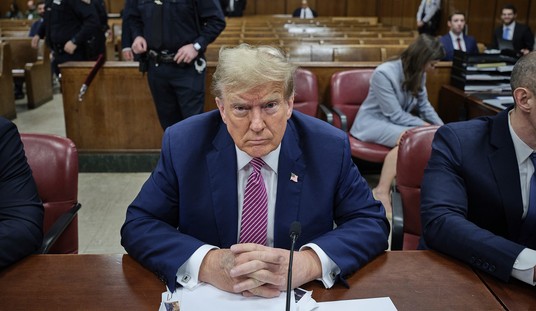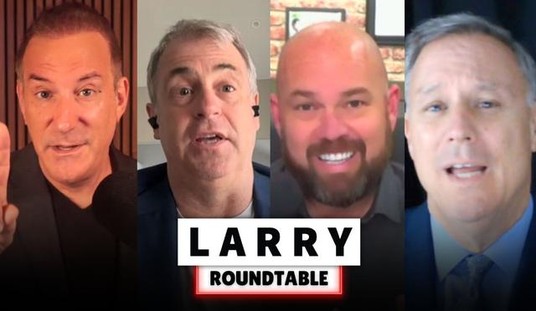Now that our elected leaders have finally found a way to avert the Great Debt-Ceiling Disaster with an imperfect settlement that generally advances the conservative agenda, mainstream Republicans must prepare to answer the objections of Tea Party True Believers who grumble, "If we had just held on, we could have gotten more."
This objection to the fizzled crisis faces one overwhelmingly significant question: how?
In countless conversations, both on my radio show and in private, I've never found an advocate for the "stand on principle and never compromise" crowd who could sketch out a plausible scenario by which conservatives gain from pushing a potential settlement beyond August 2.
Sure, it's sound policy to avoid borrowing more when you're already disastrously in debt. But that doesn't give you the option to stiff creditors forever when you've already committed (by law) to paying their money.
Michele Bachmann, Joe Walsh, Rush Limbaugh, Ron Paul, and other champions of the "No Deal, No Problem" school of thought never confront the uncomfortable reality that under any scenario, with any possible political resolution, the government must pay obligations that it's already undertaken—not just to creditors, but to contractors and employees with legally enforceable contracts. Paul might flirt with the idea of the federal government declaring bankruptcy and welshing on its debts, but that would mean very simply the total collapse of the economic system of the U.S. and a worldwide depression to rival the 1930s.
So if it's a given (and it should be) that the government can only delay, not avoid, borrowing the money it needs to pay its obligations, what exactly is the gain from raising costs (increased interest, penalties for delay, added obligations for closing and then re-opening various government offices, damaged prospects for recovery) by provoking a thoroughgoing disruption? Some purists insist that it would actually help the country if hitting the debt ceiling forced the government to immediately reduce spending by 40 percent, since nearly half of the federal government's undertakings are frivolous. But legally, constitutionally, you can only close those departments, eliminate those functions and save that money through a majority vote in both houses of Congress (inconceivable with a Democratic Senate), not by refusing to pay out money that's already been appropriated and that the government is formally obligated to pay.
Recommended
There's another idiotic assumption that motivates those sincere but deluded patriots who mourn the catastrophic breakdown that might have been: They argue that President Obama would be blamed for the disaster and Republicans—particularly stalwart Tea Party Republicans—would escape unscathed and avoid all responsibility.
This assumes that the public has paid no attention to the basic structure of the dispute: Obama wanted the debt-ceiling extension, and visibly pleaded for it and bargained for it. Republicans refused to give it to him because the president stubbornly (his advocates say courageously) refused to give in to their demands. But in a highly visible standoff, it was the president who wanted business as usual—raising the debt ceiling and getting on with the nation's other agenda—while Republicans refused to grant an authorization that is normally routine.
In other words, Obama wanted to pay the bills, and the GOP would only pay the bills if the president made concessions. So if the bills don't get paid, and the nation suffers, who's likely to get blamed?
Every poll of the last few weeks showed clear majorities—even of self-described Republicans—preferring some settlement that allowed an increase in the debt ceiling, to “standing on principle” and taking big risks with an already faltering recovery.
Worst of all, no Tea Party activist ever explained how a debt-ceiling showdown, with a partial government shutdown that would surely follow, could possibly last more than a few days—or probably a few hours.
President Obama held virtually all the cards, because when cash runs out (as it most certainly would, by August 10th or 12th, if not precisely August 2nd), the executive branch gets to decide who gets paid and who gets IOUs and enjoys the privilege of determining which government operations will be shut down. Yes, the feds would continue receiving enough revenue to pay interest on the debt, Social Security checks, military expenditures, and a few other essential services.
But it's also obvious that President Obama would elect to generate the maximum public outrage by shutting down offices and programs that ordinary people care deeply about. Remember how furious the public became when Bill Clinton closed selected national parks in 1995 as part of his government shutdown strategy? Obama would have almost certainly locked off every national park and monument, provoking heart-wrenching stories of the Brady Family from Normal, Illinois, who had saved for six years to visit Yellowstone but now missed their chance—and faced wasted airline tickets—because the Republican meanies shuttered the parks.
And speaking of airlines, if the president elected to shut down all but emergency air travel (because there wasn't money to pay air traffic controllers), how long would the paralysis last, do you suspect?
Twelve hours? Maybe less?
In any event, in the face of national hysteria and indignation enough Republicans would surely come to their senses in a matter of days and do anything—ANYTHING—to end the catastrophe, including giving Obama the "clean" (no built-in cuts) debt-ceiling increase he always wanted.
In other words, provoking a dramatic showdown would not only hand the president a flashy victory, but would win the GOP less progress on spending—not more—than the party actually achieved with the deal John Boehner negotiated.
To these altogether logical arguments, the shut-'er-down fanatics offer only slogans: "Stand Firm," "Stick to Your Principles," "Winners Never Compromise." That last bromide was particularly favored by the great Rush Limbaugh, still the revered and influential chieftain of the conservative media herd (and my own benefactor, I should acknowledge, in terms of giving me my first chance in the radio business as his frequent guest host).
The obvious challenge for El Rushbo: "If Winners Never Compromise," does that mean Ronald Reagan wasn't a winner? He not only compromised frequently and necessarily with House Speaker Tip O'Neill (consider the huge Reagan tax hike of 1982) but also made meaningful deals with head commie Mikhail Gorbachev that helped win the Cold War.
The grumbling by the hard right obscures the magnitude of Boehner's achievement in his steady, skillful handling of the debt debate: The speaker and his leadership team have succeeded in changing the fundamental nature of the debate in Washington.
During the first two years of Barack Obama's presidency, the only real debate was over how much more the federal government would spend. Today, the only real debate is on how much more we will cut.
Boehner and colleagues will be honored by history because they had the good sense and, yes, courage, to take yes for an answer.
Staying firm to Tea Party principles never required that the GOP pursue a mad, doomed, suicide strategy that would lead to their wholesale political destruction.
Conservatives should continue to sip tea, but they're clearly better off if they avoid swallowing Kool-Aid.
A version of this column ran originally in THE DAILY BEAST on August 1, 2011

























Join the conversation as a VIP Member